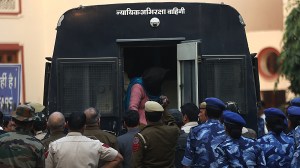Stay updated with the latest - Click here to follow us on Instagram
Symposium in PGI reveals need for awareness on brain strokes
Smokers and patients suffering from diabetes or high blood pressure are more prone to brain stroke,but it can be prevented through early treatment.
Smokers and patients suffering from diabetes or high blood pressure are more prone to brain stroke,but it can be prevented through early treatment. As a stroke does not strike unannounced,it is important to recognise the warning signs before a stroke becomes fatal. The warning signals include visual disturbances,numbness in a part of the limbs,dizziness and slurred speech.
These and many more important facts about brain strokes and their management were discussed at the first annual PGI symposium named SOS: Strike Out Stroke organised by the Department of Neurology,PGIMER,today.
The event focused on brain stroke management in an emergency,which requires a coordinated team effort of health care personnel.
Ways to reduce pre-hospital and in-hospital delays and the need for imaging and role of surgery in stroke were discussed. Importance of nursing care was emphasized. The event was attended by a wide spectrum of health care professionals including nurses,internists,neurologists,radiologists,interventionists and neurosurgeons.
Statistics reveal that 1.5 million people suffer from strokes in India each year. Only a negligible number reach medical facilities in time which is because of lack of awareness of stroke-related screening and treatment modalities. Further,brain stroke is the third largest killer in India after heart attack and cancer and the second largest in the world,according to the World Health Organisation. About 20 per cent of heart patients are susceptible to it.
It is believed that the average age of patients with stroke in developing countries is 15 years lower than that in developed countries In India,nearly one-fifth of patients with first ever strokes admitted to hospitals are aged 40 years.
These days,due to sedentary lifestyle and wrong eating habits,stressful jobs,more and more young patients are reaching for medical help for brain strokes,said the doctors.
Given the evidence of effectiveness of thrombolysis for acute stroke and of stroke units,stroke should be treated as a medical emergency. Prompt recognition of symptoms and early referral for thrombolysis to the nearest hospital with available infrastructure is hence needed. Importance of public awareness regarding the need to avail of therapy as soon as possible was emphasized.
The conference brought together all types of health care providers including nursing staff who are generally the first points of care,familiarising them with protocols in stroke care,facilitating early intervention in stroke patients through a well knit network.
Another lacking area in the city of Chandigarh is in linking the major hospitals like Government Multi Specialty Hospital,Sector 16 and GMCH 32 with PGI,in the area of brain stroke management.
Prof JS Chopra,Professor Emeritus of Neurology inaugurated the symposium and shared his experience on acute stroke management. Prof S Prabhakar,Prof SN Mathuriya,Prof N Khandelwal and other eminent faculty led case discussions and lectures on a range of topics related to stroke management.







